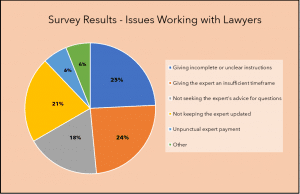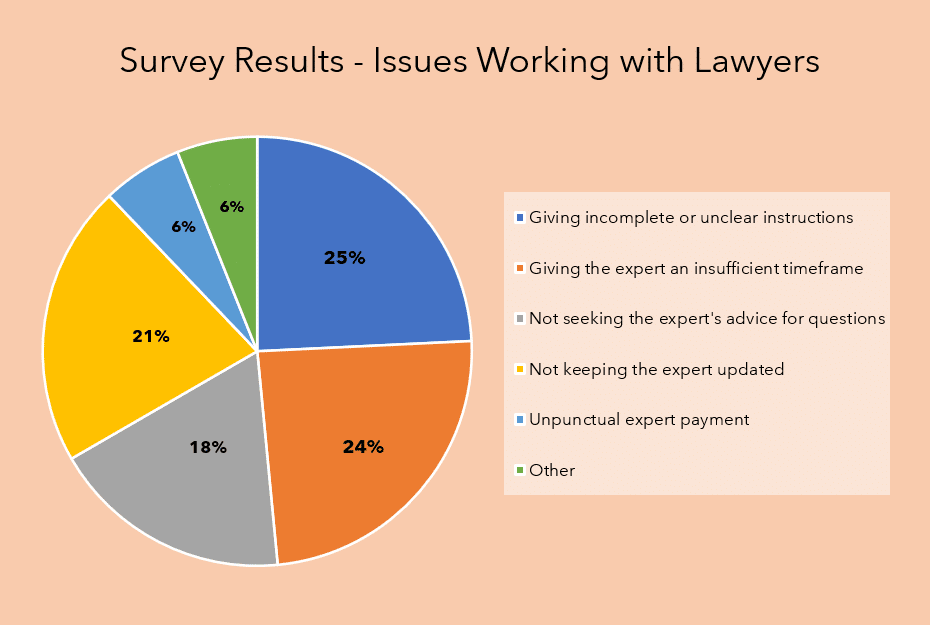As expert witness evidence often decides the outcome of the case, it is of prime importance that solicitors ensure clear communication with the expert to present the best possible evidence for their case. Unclear communications, misunderstandings, and many other potential mistakes hinder the expert’s capacity to provide the best possible evidence.
We recently surveyed over 5,000 experts on our database and asked them what inconveniences they have experienced while working on matters. Here, we reveal the most common issues experts have experienced with lawyers, and we also suggest measures to avoid these issues.
The chart below provides an overview of the survey results:

Mistake #1: Not seeking the expert’s advice for questions
The questions are the most important part of the letter of instruction; they form the foundation of the arguments of the expert report. If not consolidated by the expert, the questions risk being irrelevant or too general to address the actual issues of the case.
Given their expertise, experts can identify underlying issues that may not be obvious to a layperson or a lawyer. Experts can assist in providing specific, considered, and targeted questions that address these root issues. Prior to the report stage, setting up a teleconference with the expert or asking for a preliminary opinion will assist in determining what questions need to be asked.
Mistake #2: Giving incomplete or unclear instructions
Expert evidence not only relies on the expert’s specialised knowledge but also on the background and materials provided by the solicitors. If this information is insufficient or provided in a piecemeal manner, then the expert will be unable to form a well-reasoned and well-informed opinion.
It is important to give as full a briefing of the case as possible – give a specific and clear outline of the matter and highlight the relevant issues for which the expert opinion is required. Take into consideration what likely questions may be asked on either side and inform your expert of all the relevant information available. Most importantly, provide all information as completely as possible, and not in small, staggered fragments.
Mistake #3: Giving the expert an insufficient timeframe
Engage the expert as soon as possible. When the need for an expert arises, consider what type of expert is needed, what they need to comment on, and what materials are required. This way a comprehensive brief can be prepared at least a week before a consultation with the expert, not a week before an expert report is due in court!
It is unrealistic to ask an expert to prepare a report a week before a trial is due. Experts need time to review case materials and facts of the case. Following a review of the material, lawyers will also benefit from further discussion with experts on technical matters and facts of the case.
Mistake #4: Not keeping the expert updated
Lack of communication is one of the leading causes of a sub-par experience with an expert. Often, the expert will not be informed about when a report is required, when they are needed in court, whether their evidence is accepted, or any other important information of which they should be informed. This also makes planning difficult, as an expert may be unable to fit a deadline into their schedule without knowing of it beforehand.
Our experts are highly capable but none of them are mind-readers. Keep the expert updated on how the matter is proceeding. This includes due dates, schedules, when new material has arrived, when they are required to give evidence in court, and when a case has completed, among many other considerations.
Mistake #5: Being unpunctual with payment or not paying an expert for their time
Experts sometimes do not receive payment in a timely manner or are not compensated fairly for taking time out of their day to provide valuable input to a case. Given how crucial experts are to a case, it is important to ensure they are fairly paid.
Paying experts fairly and on time fosters a good relationship with experts; it also increases the chance they would want to offer assistance in future matters. ExpertsDirect pays experts’ invoices first so that experts are not held back waiting on late lawyer payments.
Takeaways
Maintaining communication with experts and planning ahead assist in building strong expert evidence for your case. With a complete picture of the case and a sufficient amount of time to prepare a report, the expert is best equipped to write a report that considers all aspects of the case. Discussion of facts and materials with the experts will lead to better formulated questions and a better understanding of the root issues of the case. Lastly, payment of the expert for their time and skill assists in securing a healthy relationship, which may lead to an expert being more amenable to assist in future matters.
